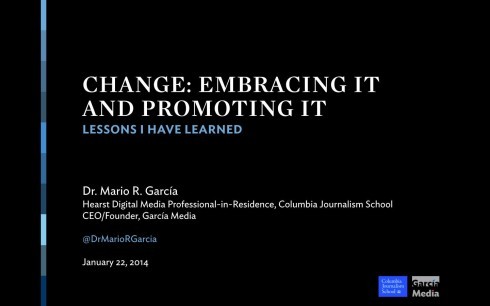TAKEAWAY: I will be welcoming the journalism students at Columbia University’s Graduate School of Journalism to the Spring Semester today.

It’s what I hope will be an inspiring, and realistic, talk, which I have titled Change: Embracing It and Promoting It.
It is a topic dear to my heart.
Recently, long time NBC anchorwoman Jane Pauley told TIME Magazine that “change intrigues me”.
Well, it intrigues me too.
In fact, I think universities should teach courses about change, and its importance. It would keep some young and enthusiastic recent grads going into the labor force from becoming discouraged when change takes longer than they thought to take hold.
My talk to the Columbia students is direct:
—We are all agents of change (if we wish to be).
—Change should be an academic subject, one that students take just before graduation to prepare them to cope with the dynamics of change: when it works (it’s magic), when it doesn’t (which is often), when the agent of change appears (the music plays), when someone with power and authority favors change (the angels smile), and, of course, when those in power fear change (more often than you can imagine).
—I will then turn to five projects in my long career where change played a protagonistic role and why. Some are projects from the past, two are from the present. In each of them there is a lesson: those projects would not have achieved as much as they did without change driving them.
Those projects are: The Wall Street Journal, El Tiempo (Colombia), Die Zeit (Germany), Aftenposten (Norway), Paris Match (France).
The Wall Street Journal—
Lesson: Don’t let the current status of things intimidate you. Propose change. Present the ideas, and, if they are well founded and appeal to the right people, change will be on its way.
Die Zeit
Lesson: Change may not be easy to come to, as was the case with Die Zeit, Germany’s intellectual newspaper. It took 11 prototypes before the portals of change opened wide. And how!
El Tiempo
Lesson: Sometimes you must pretend that the present does not exist, and charge full blast into the future, as we did here, imagining that this centenarian daily did not exist, and asking the question: how would we create a new, authoritative newspaper for Colombia today? The new El Tiempo was born.
Aftenposten
Lesson: Change sometimes comes dressed as a person, as in a new editor, a la Espen Egil Hansen, of Aftenposten. He came and he conquered, full of ideas, and totally open to dramatic change.
Work in progress that will surprise many.
Paris Match Lesson: Initiate change. Sometimes what you are assigned to do and what you do are two different things. Don’t be afraid to propose dramatic change. If you present it well, it may find residence right then and there.